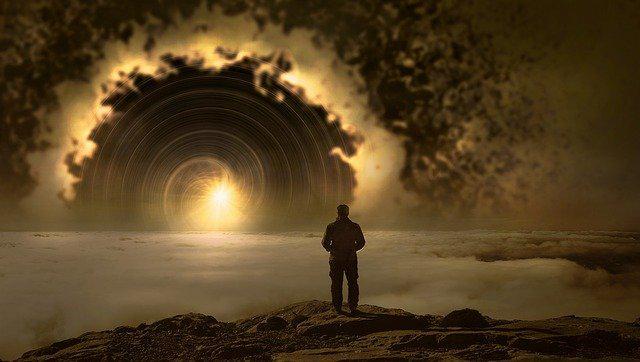Famous historian Zhang Hao’s book Dark Consciousness and Democratic Tradition mentions that dark consciousness is the dark side of human nature. Regarding human nature, there are two kinds of thoughts that have the greatest influence, one is the theory of evil nature and the other is the theory of good nature. The former, such as Christianity, thinks that human nature is evil and dark. The latter, such as Confucianism, believes that human nature is good.
The book holds that dark consciousness is the foundation of human history, and every civilization has dark consciousness. “The so-called dark consciousness comes from the face-up and awareness of all kinds of dark forces inherent in human nature or the universe. Because these dark forces are deeply rooted, the world is flawed and imperfect, and human life is full of ugliness and regrets.” (Zhang Hao, Dark Consciousness and Democratic Tradition, Chengdu, Sichuan Publishing Group, 2003) It is the response to the dark consciousness of human nature that promotes the development of history. The development of history is to overcome the dark consciousness.
The Christian theory of evil nature is the fundamental doctrine of Christianity and the starting point of western legal and political culture. Paul says in his letter, “For all have sinned and fall short of the glory of God.” (Romans 3:23) “Therefore, just as sin entered the world through one man, and death through sin, and in this way death came to all people because all sinned.” (Romans 5:12) Based on Paul’s view of sin, Augustine put forward the theory of original sin. It is believed that the depravity of Adam and Eve was passed on to future generations through both sexes, so everyone after Adam and Eve has original sin.
In medieval culture, human sin was directly embodied. “Gregory listed seven ‘unforgivable sins’: vanity, jealousy, anger, melancholy, depression, greed, overeating and lust.” (Liu Cheng’s Study on the Living State of “Man” in the Christian Cultural Environment of Western Europe in the Middle Ages, Beijing Normal University Press, March 2012, p. 19)
In modern western legal philosophy, among the three natures of natural law, the original state of human beings is the natural state is a state of war because everyone wants to possess others. Hobbes believed that everyone is an egoist, so human society must be in a state of war before entering the social state. “When there is no common power to subdue everyone, people will be in the so-called state of war. This kind of war is a war between everyone.” (Thomas Hobbes’ Leviathan, Commercial Press, 2017, pp. 94-95)
Confucianism in China also has its dark consciousness. For instance, Chinese philosopher Xunzi says, “People’s nature is evil, and those who are good are false. The nature of today’s people is that they are born with good benefits, and they are obedient, so they compete for life and give way to death. However, there are diseases and evils in life, so the residual thief is born but loyal and faithful. I have the desire to have eyes and ears, have a good voice, and be obedient. Therefore, I am promiscuous, but I am ignorant of propriety, righteousness, and arts.” (Xunzi’s “On Evil Nature Essay 23”)
Although both China and the West acknowledge the dark consciousness of human nature, the ways to overcome it are different, which leads to different civilizations and social and political systems.
The way to overcome the dark consciousness of Christianity is to establish a legal rule system, and limit the desire for power in a cage by restricting human nature and making rules. The social chaos caused by the evil of human nature makes people aware of the cruelty of this state, so they transfer some power by contract, so that the transferred power is handed over to the state, and the public power of the state maintains the social order within the established rules. It is out of the dark consciousness that people still take the non-transferable power as their own, which is the disobedience of evil laws and the resistance to tyranny. It is the distrust of dark consciousness that any decision of public power must go through complicated procedures.
Therefore, in the dark consciousness, the west chose the rule of law, thus coming out of a different democratic political system in the east.
Although China’s Confucianism also has dark consciousness, the way to overcome it is not through the legal system, but through morality. From the Three Emperors and Five Emperors to King Yao, Shun and Yu, they were shaped into moral sages. It was the perfection of morality that made them overcome their dark consciousness. Therefore, the Confucian idea is not to make rules, but to emphasize inner cultivation, the so-called “inner sage and outer king”. It’s a bit like Plato’s philosophy, a king in his ideal country. However, relying on personal cultivation to overcome the dark consciousness often leads to an infinite loop and becomes self-supervision. Therefore, in this culture, we can only see that the image of the molded moral sage, especially the emperor, is deliberately publicized as a moral perfectionist, with the purpose of covering up his immoral way to gain power.
Zhang Hao’s book Dark Consciousness and Democratic Tradition is a comparison between the two civilizations, which brings us a reflection on our own civilization. Therefore, we should take a critical attitude towards traditional culture, actively absorb other civilizations and actively communicate with other cultures in the world. Only in this way can we overcome the dark side of our own civilization and bring about our own development.
- Translated by Charlie Li












